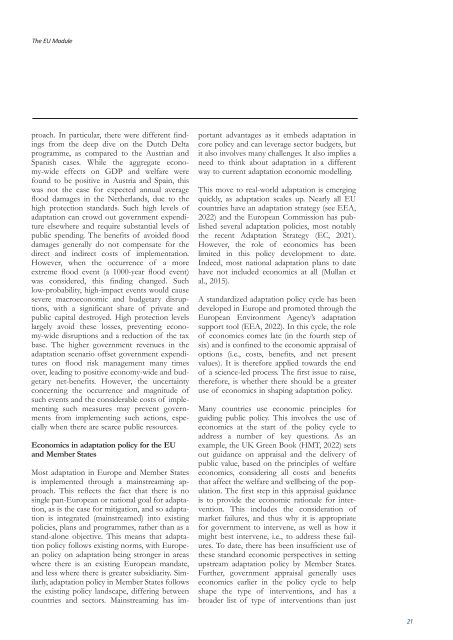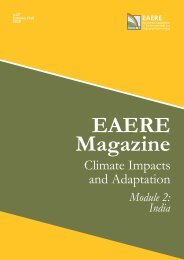EAERE Magazine - N.16 Spring 2022__
You also want an ePaper? Increase the reach of your titles
YUMPU automatically turns print PDFs into web optimized ePapers that Google loves.
The EU Module<br />
proach. In particular, there were different findings<br />
from the deep dive on the Dutch Delta<br />
programme, as compared to the Austrian and<br />
Spanish cases. While the aggregate economy-wide<br />
effects on GDP and welfare were<br />
found to be positive in Austria and Spain, this<br />
was not the case for expected annual average<br />
flood damages in the Netherlands, due to the<br />
high protection standards. Such high levels of<br />
adaptation can crowd out government expenditure<br />
elsewhere and require substantial levels of<br />
public spending. The benefits of avoided flood<br />
damages generally do not compensate for the<br />
direct and indirect costs of implementation.<br />
However, when the occurrence of a more<br />
extreme flood event (a 1000-year flood event)<br />
was considered, this finding changed. Such<br />
low-probability, high-impact events would cause<br />
severe macroeconomic and budgetary disruptions,<br />
with a significant share of private and<br />
public capital destroyed. High protection levels<br />
largely avoid these losses, preventing economy-wide<br />
disruptions and a reduction of the tax<br />
base. The higher government revenues in the<br />
adaptation scenario offset government expenditures<br />
on flood risk management many times<br />
over, leading to positive economy-wide and budgetary<br />
net-benefits. However, the uncertainty<br />
concerning the occurrence and magnitude of<br />
such events and the considerable costs of implementing<br />
such measures may prevent governments<br />
from implementing such actions, especially<br />
when there are scarce public resources.<br />
Economics in adaptation policy for the EU<br />
and Member States<br />
Most adaptation in Europe and Member States<br />
is implemented through a mainstreaming approach.<br />
This reflects the fact that there is no<br />
single pan-European or national goal for adaptation,<br />
as is the case for mitigation, and so adaptation<br />
is integrated (mainstreamed) into existing<br />
policies, plans and programmes, rather than as a<br />
stand-alone objective. This means that adaptation<br />
policy follows existing norms, with European<br />
policy on adaptation being stronger in areas<br />
where there is an existing European mandate,<br />
and less where there is greater subsidiarity. Similarly,<br />
adaptation policy in Member States follows<br />
the existing policy landscape, differing between<br />
countries and sectors. Mainstreaming has important<br />
advantages as it embeds adaptation in<br />
core policy and can leverage sector budgets, but<br />
it also involves many challenges. It also implies a<br />
need to think about adaptation in a different<br />
way to current adaptation economic modelling.<br />
This move to real-world adaptation is emerging<br />
quickly, as adaptation scales up. Nearly all EU<br />
countries have an adaptation strategy (see EEA,<br />
<strong>2022</strong>) and the European Commission has published<br />
several adaptation policies, most notably<br />
the recent Adaptation Strategy (EC, 2021).<br />
However, the role of economics has been<br />
limited in this policy development to date.<br />
Indeed, most national adaptation plans to date<br />
have not included economics at all (Mullan et<br />
al., 2015).<br />
A standardized adaptation policy cycle has been<br />
developed in Europe and promoted through the<br />
European Environment Agency’s adaptation<br />
support tool (EEA, <strong>2022</strong>). In this cycle, the role<br />
of economics comes late (in the fourth step of<br />
six) and is confined to the economic appraisal of<br />
options (i.e., costs, benefits, and net present<br />
values). It is therefore applied towards the end<br />
of a science-led process. The first issue to raise,<br />
therefore, is whether there should be a greater<br />
use of economics in shaping adaptation policy.<br />
Many countries use economic principles for<br />
guiding public policy. This involves the use of<br />
economics at the start of the policy cycle to<br />
address a number of key questions. As an<br />
example, the UK Green Book (HMT, <strong>2022</strong>) sets<br />
out guidance on appraisal and the delivery of<br />
public value, based on the principles of welfare<br />
economics, considering all costs and benefits<br />
that affect the welfare and wellbeing of the population.<br />
The first step in this appraisal guidance<br />
is to provide the economic rationale for intervention.<br />
This includes the consideration of<br />
market failures, and thus why it is appropriate<br />
for government to intervene, as well as how it<br />
might best intervene, i.e., to address these failures.<br />
To date, there has been insufficient use of<br />
these standard economic perspectives in setting<br />
upstream adaptation policy by Member States.<br />
Further, government appraisal generally uses<br />
economics earlier in the policy cycle to help<br />
shape the type of interventions, and has a<br />
broader list of type of interventions than just<br />
21













